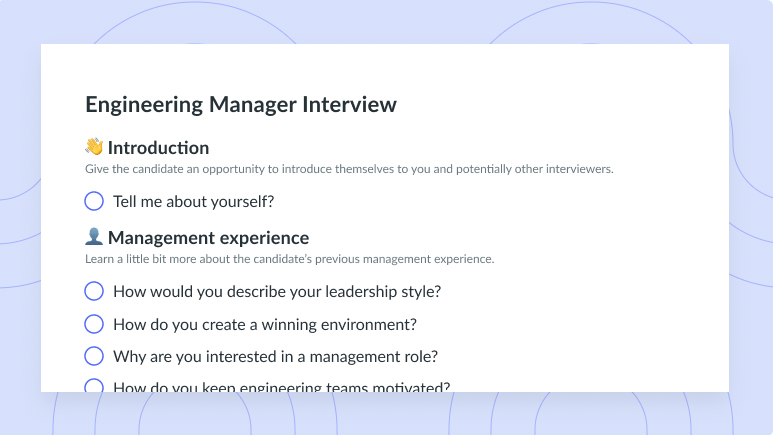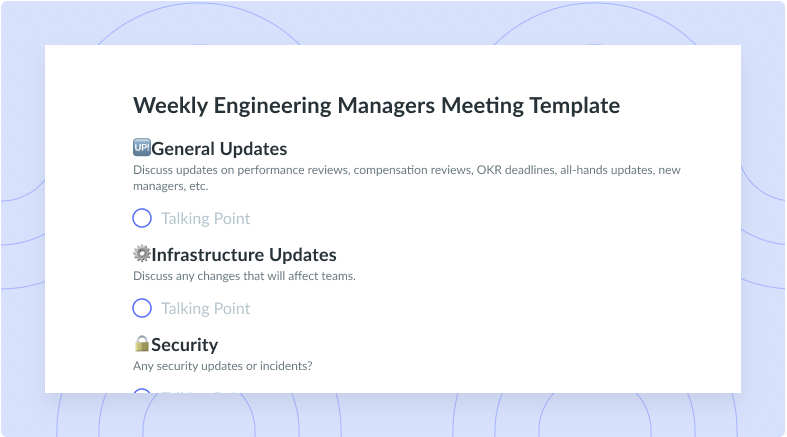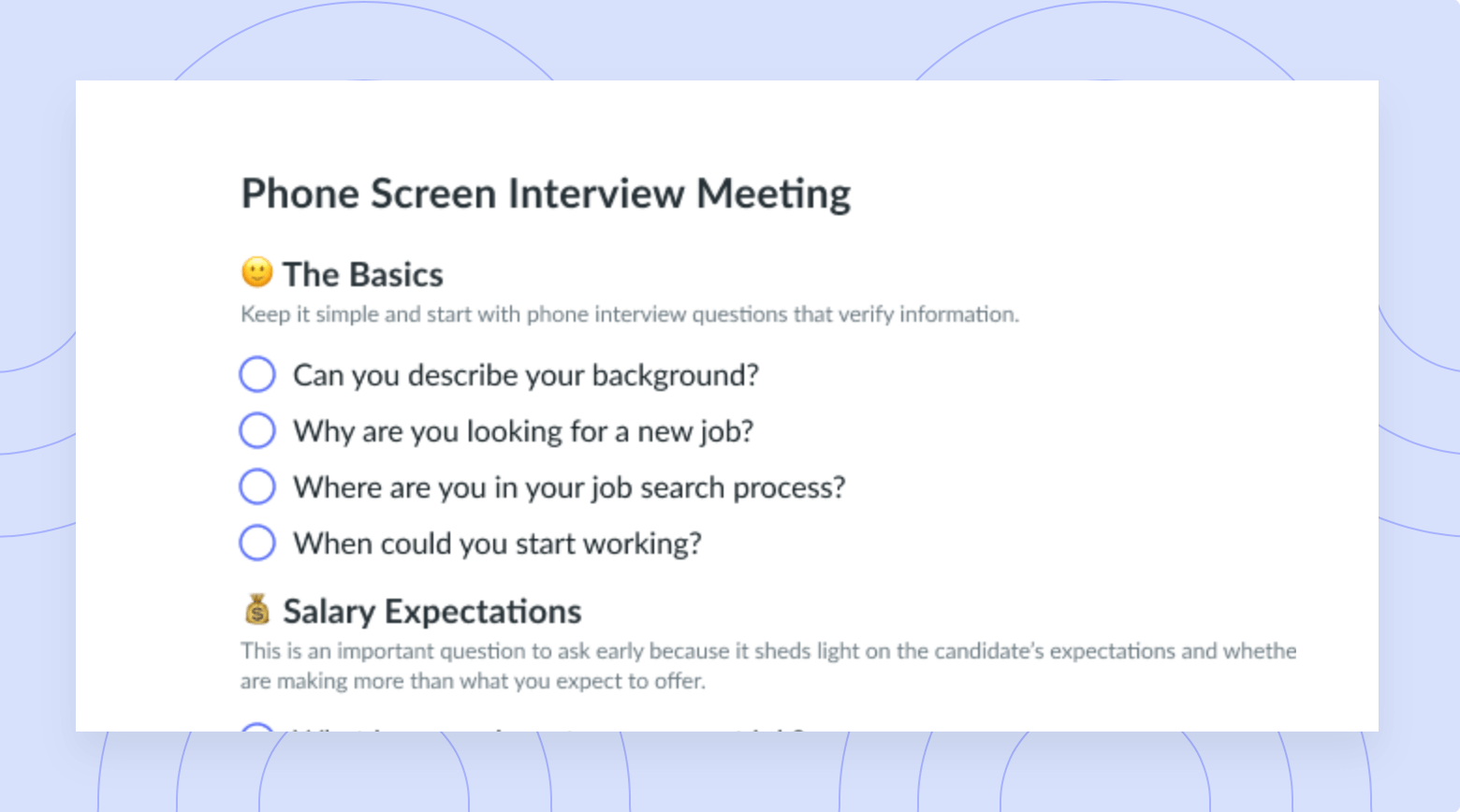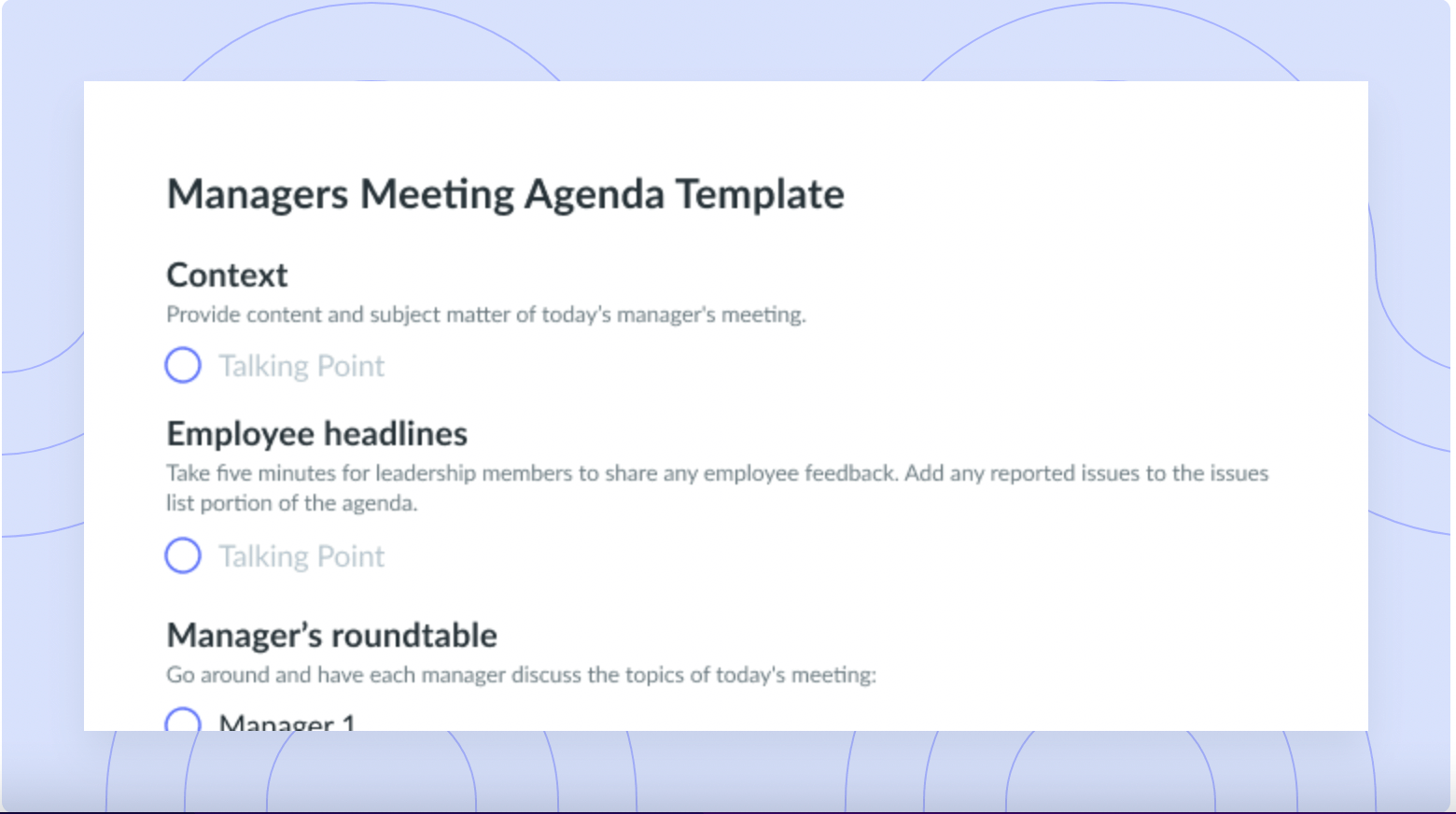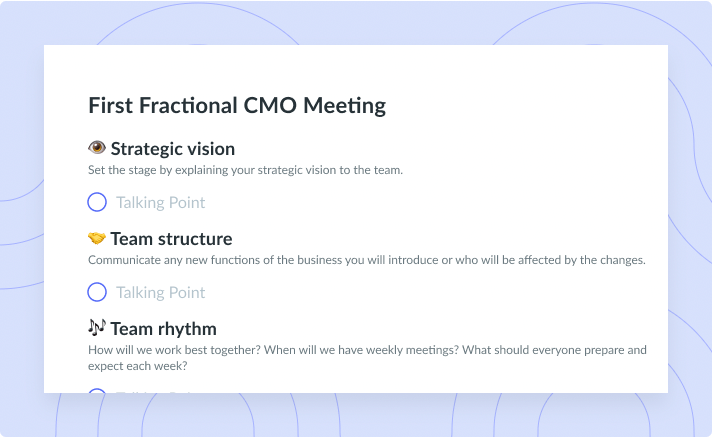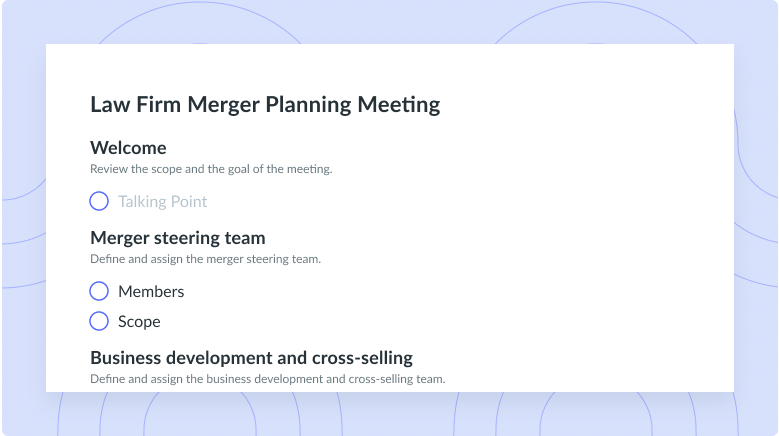Managing Engineering Managers: 6 Tips + Free Templates
Learn how certain leaders move into a position where they’re managing engineering managers and the industry’s best tips and tricks.
How does someone move into a position where they’re managing managers? At large software or technology companies, you often see titles like “Director of Engineering” or “VP of Engineering,” but you never see concrete job descriptions that outline exactly how to obtain such a position. Managing engineering managers requires specific skills, experience, and typically a degree in engineering. You also generally have to gain a certain amount of technical, mechanical, or software experience while also exhibiting strong leadership traits and soft skills like a strong work ethic, good decision-making abilities, impressive time management, and great communication skills.
- What does a manager of engineering managers do?
- 6 tips for managing engineering managers
- How to land the role of managing engineering managers
What does a manager of engineering managers do?
First off, the manager of engineering managers can hold various different titles, like “Head of Engineering,” “Vice President of Engineering,” and “Director of Engineering,” among many others. So, what does this role of managing engineering managers entail? The principal role of the manager of engineering managers is to ensure that engineering managers have all of the background knowledge, information, tools, and resources to lead their teams in successfully achieving the engineering goals of the organization. The manager of engineering manager, therefore, heads the successful running of all engineering projects.
It’s difficult to find an equal balance between technical knowledge and strong people management skills when you’re looking for a manager of engineering managers. Often, the organization will have to choose the best-fit skills for the projects being deployed and for the company culture. Of course, this individual needs to have some experiential overlap with the technology stack that you and your team are using. This foundational knowledge is important for leading the other engineering managers and for fostering a strong management culture between leaders at various levels. Because managing engineering managers requires very strong leadership skills, it’s an absolute must for individuals who are filling this role to have managed, hired, fired, and promoted several employees throughout their previous positions.

Run efficient meetings, come to a decision, and get back to work
Level up your engineering meeting habits to boost engagement and productivity with a collaborative meeting agenda. Try a tool like Fellow!
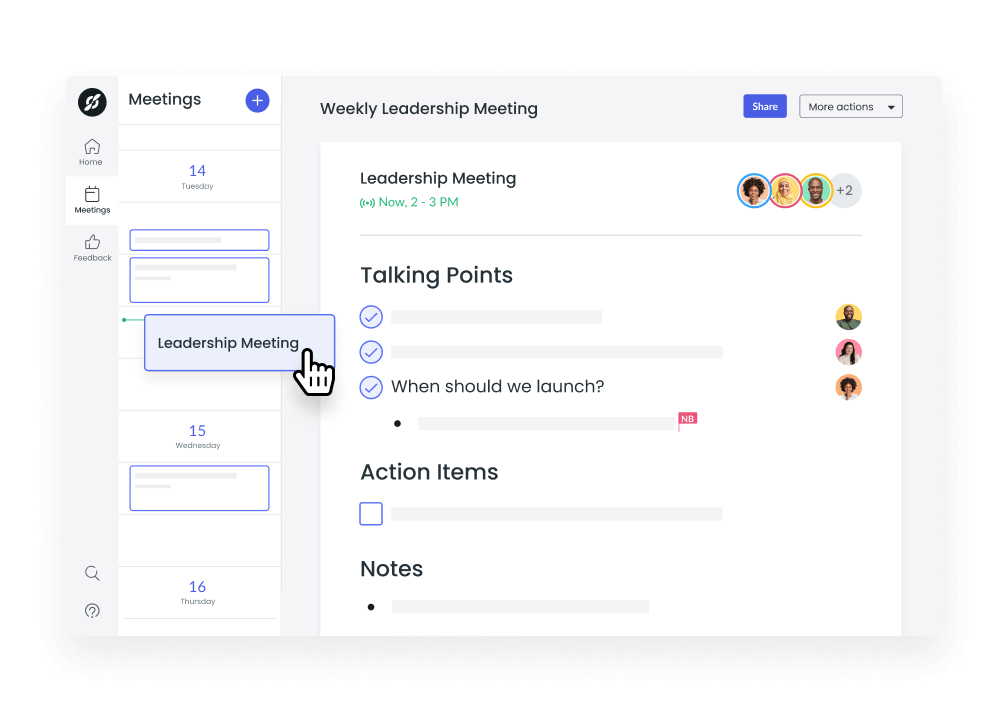
6 tips for managing engineering managers
- Host one-on-ones with the engineering manager
- Provide constructive feedback
- Hold a skip-level meeting
- Give performance reviews
- Distribute employee surveys
- Maintain a strong online presence
1Host one-on-ones with the engineering manager
If you’re currently managing engineering managers, be sure that you’re hosting regular one-on-one meetings with each engineering manager who reports to you. Hosting these regular and recurring meetings is a way for you to prompt questions that collect your direct reports’ opinions on various aspects of the business and projects at hand. Having these meetings is also an excellent way of strengthening communications, your working relationship, trust, and efficacy in completing important project milestones. With Fellow, you can run effective one-on-one meetings by having all of your past and upcoming meeting agendas in one place, along with notes, action items, and feedback. As such, you build productivity and drive accountability with your engineering managers.
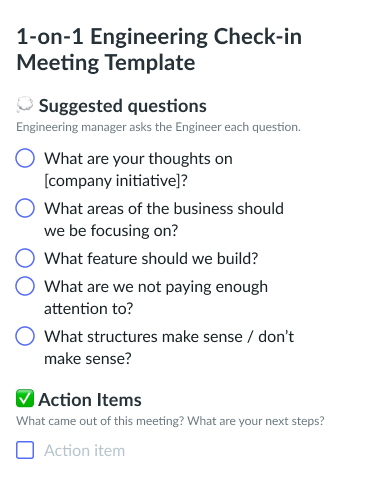
2Provide constructive feedback
It’s really important as a manager of engineering managers to provide constructive feedback to your management team. Constructive criticism is an important ingredient for personal and professional growth because it highlights areas that can be improved upon. It’s essential here, that your constructive criticism is given in a supportive tone and that it is clear that you are providing this feedback to help guide your engineering managers (not to tear them down!). Be extremely clear in the constructive feedback that you offer and provide a clear rationale for what you think it’s important. Fellow also enables you to give productive feedback to your engineering managers in a structured and supportive manner.

3Hold a skip-level meeting
Holding a skip-level meeting is another great way to develop a strong management culture in which you can effectively manage engineering managers. Skip-level one-on-one meetings are the best tool for senior managers, directors, VPs, and CEOs to understand the team’s culture and get to know the people that work in the company. Often, as a senior manager, director, or CEO, people don’t typically want to come to you with feedback or bad news. That’s why, if you want to understand what needs to change in the company, you need to go outside your office and ask the team personally. A skip-level meeting is the perfect opportunity to do so.
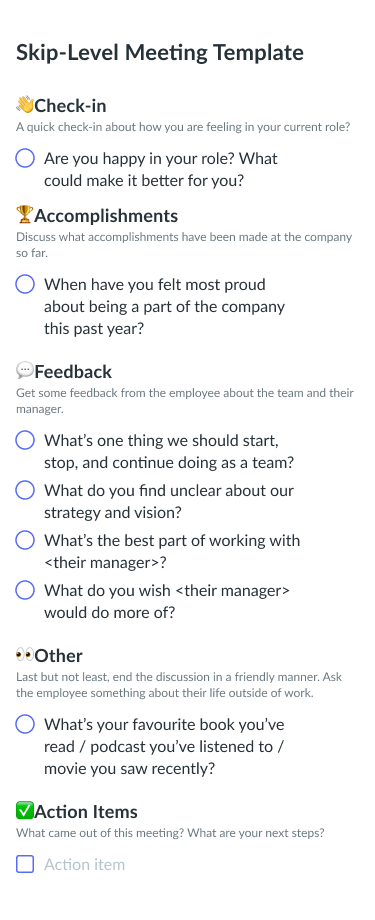
4Give performance reviews
Performance reviews are essential for the effective management of engineering managers. Quarterly performance reviews are an important piece of communication between a leader and an engineering manager. These performance reviews allow engineering managers to know where they stand within their job position, including what they’re doing well, as well as any tasks they could be executing more efficiently. Performance reviews are essential—even for organizations that conduct very thorough annual reviews—because it allows engineering managers to improve throughout the year and eliminates the need for employers to address a year’s worth of concerns in one meeting. Using a performance review agenda, you can address any potential performance issues while allowing time to praise positive behavior patterns and successes.
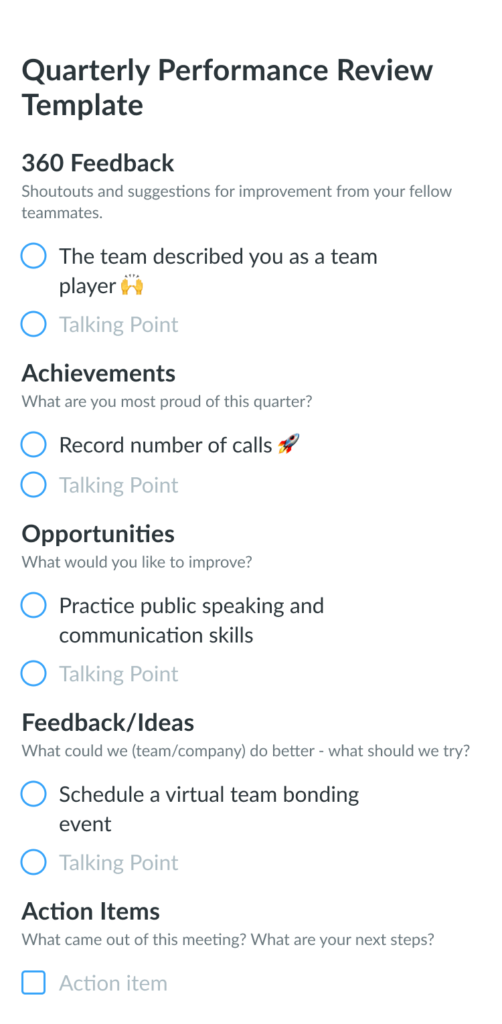
5Distribute employee surveys
Another great way to manage engineering managers is to distribute employee surveys that can be analyzed per manager. If there is a case where a given manager has a team of several employees that are unhappy or unsatisfied, as a leader of engineering managers, you should task that particular engineering manager with fixing their own team morale. The use of these surveys, therefore, drives accountability and holds engineering managers responsible for their team’s success and their team members’ well-being. In analyzing each engineering manager’s team’s performance, you can decide if that particular manager is effective and a good fit for the role.
6Maintain a strong online presence
Maintaining a strong online presence across LinkedIn, Twitter, Github, and other social platforms is another way to be a strong leader and an attractive candidate for future job openings. Moreover, if an HR department is looking to find people with similar skill sets and experience to you, they will likely be able to leverage your network and explore other attractive candidates to find a manager of engineering managers.
How to land the role of managing engineering managers
- Gain experience as an engineering manager first
- Work at a company that is rapidly growing
- Perfect your management skills
- Discuss your career goals with your manager
1Gain experience as an engineering manager first
It’s a pretty standard prerequisite for a manager of engineering managers to actually be an engineering manager first. If this experience isn’t something you have under your belt yet, focus on successfully moving into an engineering manager position first. When you obtain at least 2 years (preferably 4+) as an engineering manager and you have a solid track record of technical and people management experience (that you’re proud of) as well as strong references, you can start to think about moving into a manager of engineering managers role with confidence. You need to know how to run an engineering team seamlessly if you’re going to move into managing multiple engineering teams.
2Work at a company that is rapidly growing
A great way to acquire valuable experience and land the role of managing engineering managers is to work at a company that is rapidly growing. If you work for an organization in which there is rapid change occurring, where the pace of work is fast-forward, and where the org chart changes on a monthly basis, you have to learn and adapt very quickly. These circumstances are often the result of rapid growth within a given company. Working in start-ups or small, high-growth companies is typically a solid way of gaining experience in several roles and being involved with many aspects of a project. Look for opportunities in such companies or in businesses that have recently received a new venture capital investment. This financial enablement means the hiring of more employees and more opportunities for leadership roles for you.
3Perfect your management skills
Work on your management skills until you truly feel confident in your ability to effectively lead a team. One way of perfecting your management skills is by actively taking opportunities to learn from other leaders. Fellow’s Supermanagers podcast is a great platform and resource for managers and aspiring leaders alike! We interview leaders and managers from all walks of life to tease out the habits, thought patterns, learnings, and experiences that help them be extraordinary at the fine craft of management. Listening to podcasts is an enjoyable and valuable practice to engage in as you try to learn all there is to know about a strong management culture.
4Discuss your career goals with your manager
Be sure to discuss your career goals with and make them known to your manager. Many great organizations first look to offer their own employees opportunities for career progression before looking externally. Because companies look to retain and develop their top talent, it’s important that you make your intentions, goals, and career aspirations known to your manager so you can be considered for opportunities that arise. With your manager, create realistic and tangible objectives that will bring you close to achieving success with the organization.
Parting advice
The engineering industry can often have ambiguous roles with foggy job descriptions. It can be difficult to know exactly what it takes to move into certain positions—like one where you’re managing engineering managers. Use this guide to inform and prepare yourself to move into a leadership role where you’re managing several streams of engineering within your company. It’s also highly recommended that you try some of Fellow’s meeting templates to boost your productivity and efficiency and remain on track to achieve your goals. Using a management tool like Fellow makes managing engineering managers much less challenging because it keeps you organized and on track, and provides you with the structure you need to get things done.



![10 Tips for Managing Freelancers [+ Free Templates]](https://fellow.app/wp-content/uploads/2022/06/Managing-Freelancer.jpg)

![10 Tips to Effectively Manage an Executive’s Calendar [+ FREE Templates]](https://fellow.app/wp-content/uploads/2022/05/Effectively-Manage-an-Executives-Calendar-2.jpg)




